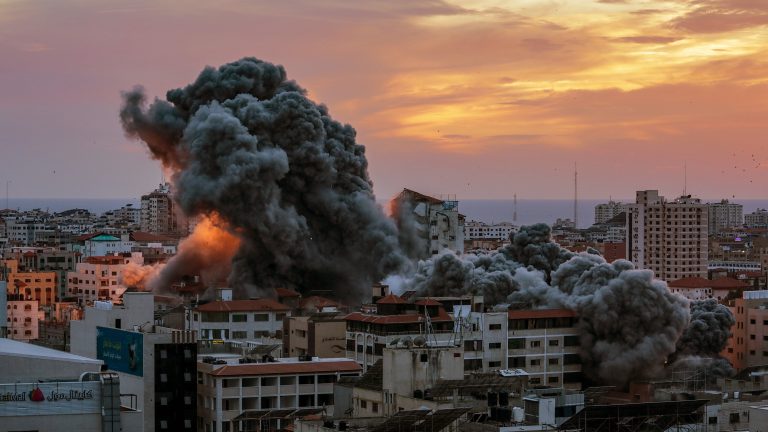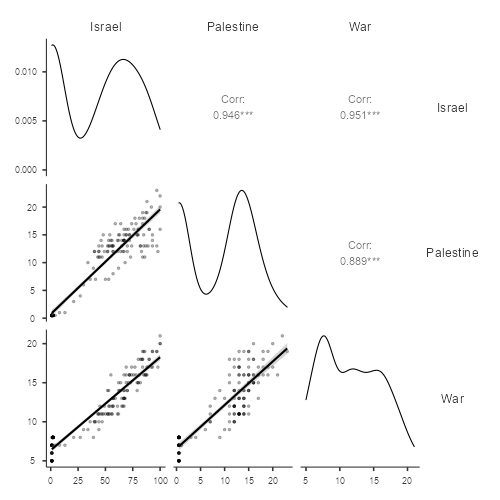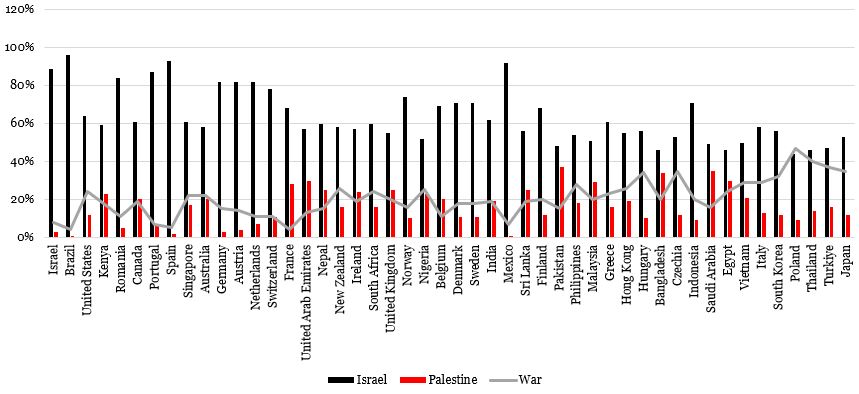
In an era defined by unprecedented connectivity and the rapid dissemination of information, global interest in key geopolitical issues has never been more pronounced. Among these issues, the longstanding conflict between Israel and Palestine continues to captivate the world’s attention. Our analysis of search interest data from various countries sheds light on the multifaceted dimensions of this enduring conflict and the differing levels of global interest it generates.
Historical Context and Global Responses
To comprehend the dynamics of this enduring conflict, we must delve into its historical underpinnings and the international response it has garnered. In 1988, the Palestinian Declaration of Independence marked a pivotal moment in the conflict’s trajectory, proclaiming the establishment of the State of Palestine. This declaration received recognition from several countries in the aftermath, setting the stage for future diplomatic efforts. In the subsequent years, a series of diplomatic initiatives sought to resolve the Israeli-Palestinian conflict. Notably, the Oslo Accords of 1993 and 1995, brokered between Israel and the Palestine Liberation Organization, aimed to establish the Palestinian National Authority as a self-governing interim administration in areas of the West Bank and the Gaza Strip. Despite these efforts, the conflict’s resolution remains elusive, and the situation remains complex.
Register for Tekedia Mini-MBA edition 19 (Feb 9 – May 2, 2026): big discounts for early bird.
Tekedia AI in Business Masterclass opens registrations.
Join Tekedia Capital Syndicate and co-invest in great global startups.
Register for Tekedia AI Lab: From Technical Design to Deployment (next edition begins Jan 24 2026).
Diverse Global Interest in the Conflict
The search interest data between October 4 and October 11, 2023 (ended at 11:04 p.m.) highlights the disparities in global interest in the Israel-Palestine conflict. Unsurprisingly, Israel commands the highest level of interest within its borders, with a staggering 89% of search interest reflecting the conflict’s direct impact on the lives of Israeli citizens. Additionally, Brazil, a country geographically distant from the conflict, displays remarkable engagement at 96%, reflecting cultural connections and a significant Jewish community.
Exhibit 1: The linkage

The Global Focus on “War” and Regional Interest
While the focus on the Israel-Palestine conflict varies, the concept of “war” garners significant attention globally, particularly in the United States, where it commands 24% of search interest. This underscores the historical role of the U.S. as a major player in international conflicts. Notably, the Middle East region demonstrates higher levels of interest in both Israel and Palestine, consistent with its geographical proximity and regional concerns. The United Arab Emirates, for instance, exhibits a substantial 30% interest in Palestine, emphasizing regional ties and commitment to the Palestinian cause. Our earlier analysis revealed a strong correlation: the more people in the countries (as seen in Exhibit 2) searched for information about Israel, the more they also showed interest in Palestine. Specifically, a 1% increase in interest in Israel corresponded to a 94% increase in interest in Palestine. When our analyst examined the inclusion of the topic of war alongside these two countries, it became evident that people in these countries demonstrated significant interest in both Israel and the concept of war. Notably, a 1% increase in their interest in Israel was associated with a 95% increase in their interest in war. Similarly, a 1% increase in interest in Palestine correlated with an 88% increase in interest in war.
Exhibit 2: Global search interest between October 4 and October 11, 2023

Discrepancy in Interest: Israel vs. Palestine
The data reveals a significant discrepancy in global interest between Israel and Palestine, reflecting broader media coverage and international relations priorities. This imbalance can be viewed through the lens of global media coverage, raising questions about potential bias in global discussions surrounding the conflict.
Global Players in the Conflict
Understanding the dynamics of global interest in the Israel-Palestine conflict also requires examining the countries that actively support the involved parties. Currently, 84 countries express their support for Israel, including major players like the U.S., the UK, Australia, and a consortium of European nations. On the other hand, several countries, with Iran at the forefront, have rallied behind Hamas, the fundamentalist Islamic group that controls the Gaza Strip. This support takes the form of substantial financial and military assistance. Additionally, countries such as Qatar, Turkey, Lebanon, Syria, Yemen, Jordan, and the Arab League have showcased varying degrees of support for Hamas, which further complicates the resolution of the conflict.
Global Reactions to the Conflict
The ongoing Hamas-Israel conflict has prompted global reactions, with protests and demonstrations erupting in various countries, including Bahrain, Morocco, Turkey, Yemen, Tunisia, and Kuwait. These widespread protests championing Palestinian solidarity underscore the deep-seated concerns about the volatile situation in the region. Overall, the Israel-Palestine conflict continues to captivate the global stage, shaped by a myriad of factors, including regional dynamics, historical ties, and media coverage. Understanding the complexities of this enduring conflict is vital for fostering informed, balanced, and constructive dialogue, ultimately contributing to the pursuit of peace and stability in the region.



